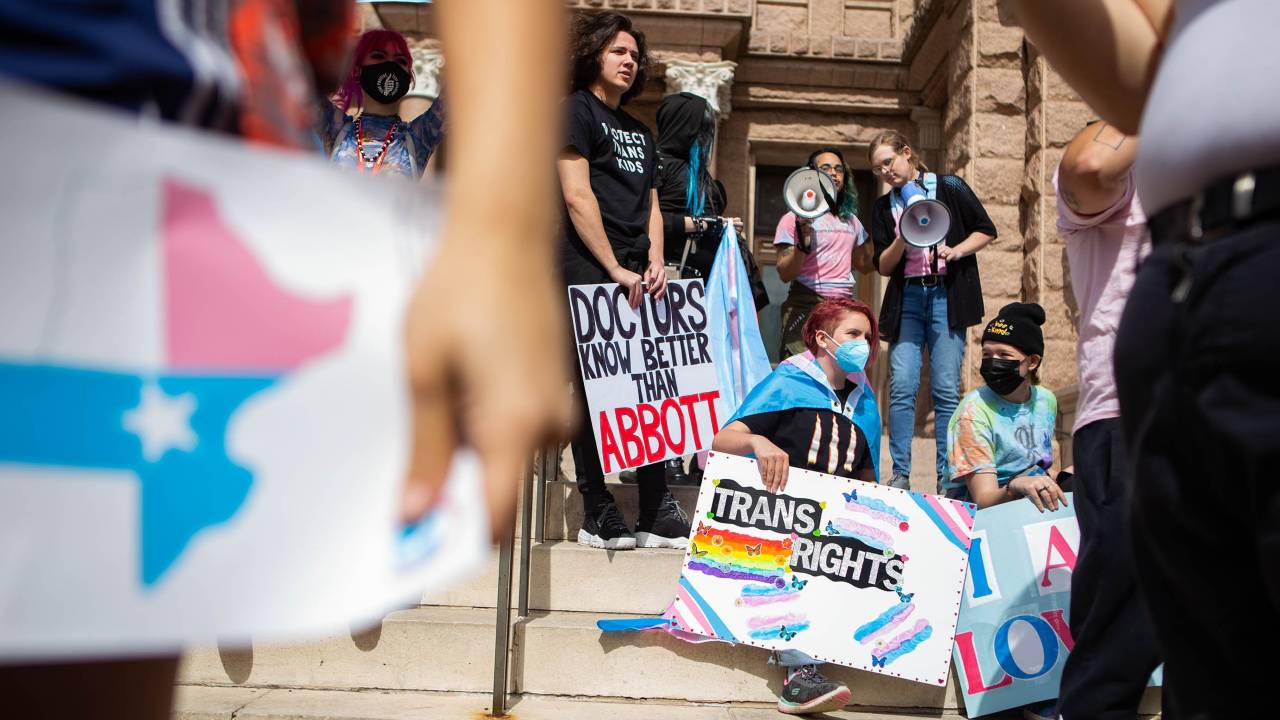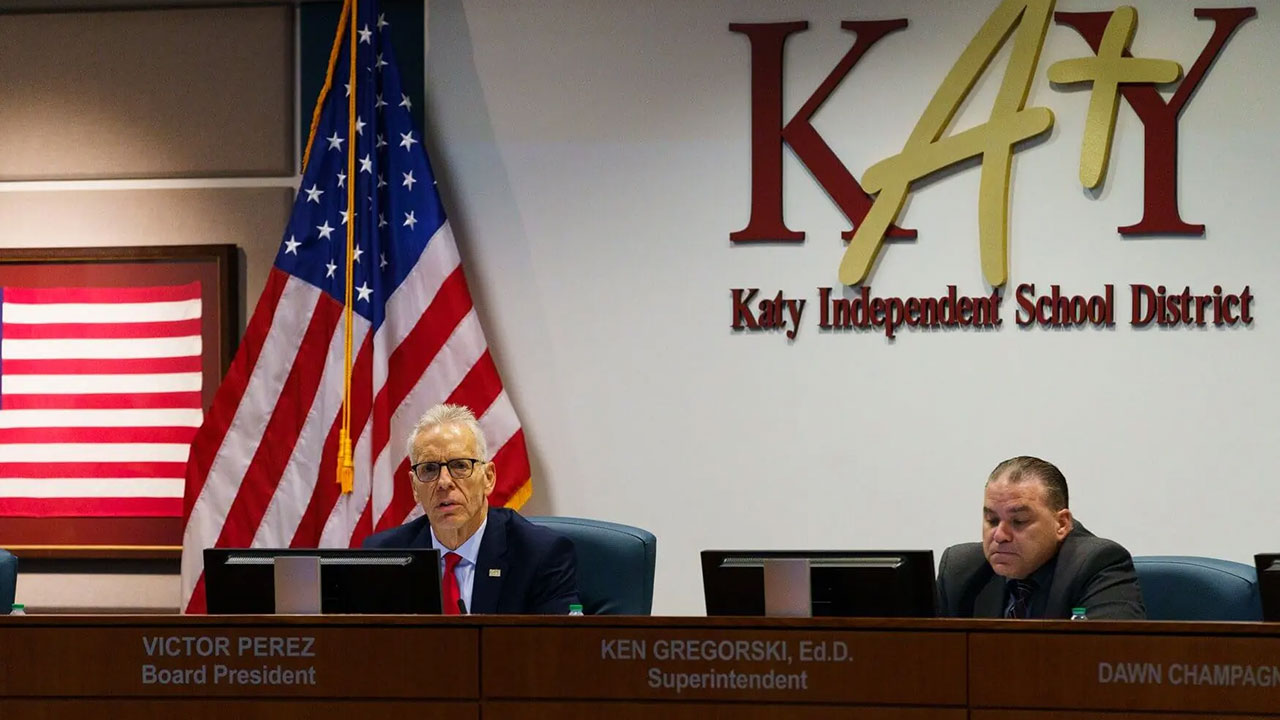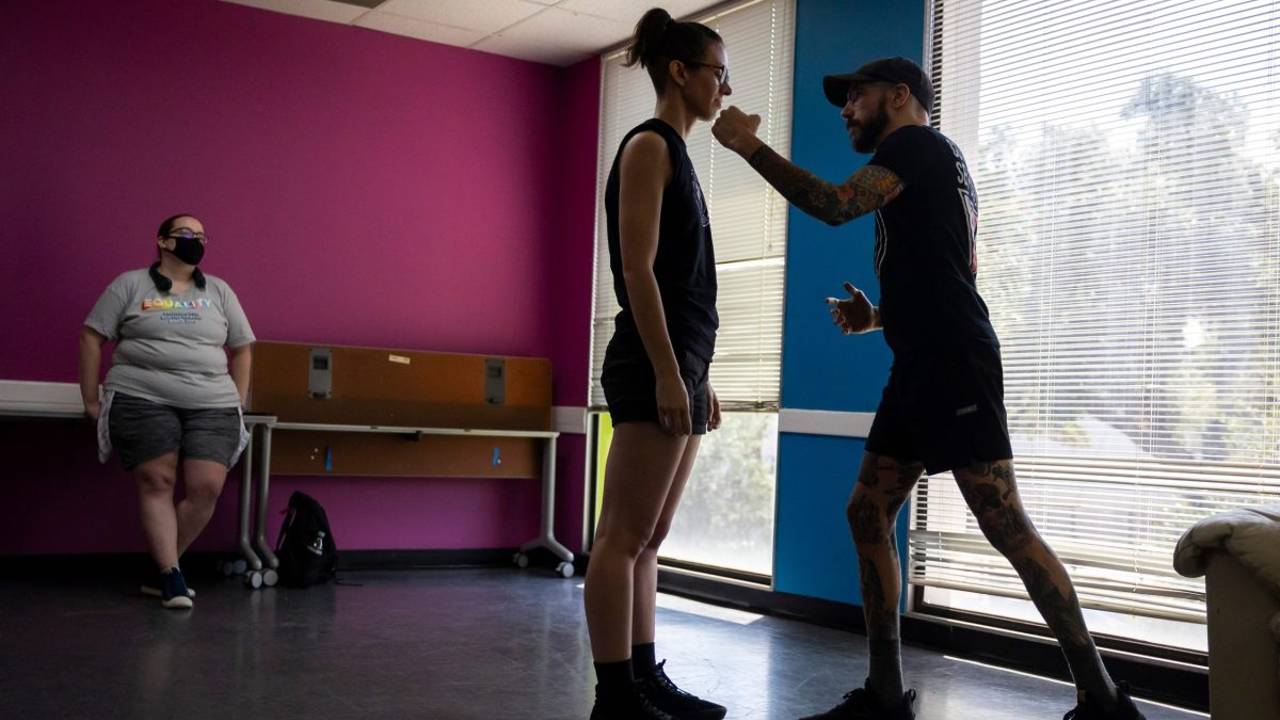Houston
Houston hospital pauses hormone therapy for transgender children as threats of child abuse investigations loom
Citing potential criminal penalties, Texas Children’s Hospital will no longer provide hormone therapy to transgender patients.

This article originally appeared in The Texas Tribune
 Texas Children’s Hospital in Houston has stopped providing hormone therapy to transgender children after Gov. Greg Abbott directed the state’s child welfare agency to open child abuse investigations into parents who provide gender-affirming care to their children.
Texas Children’s Hospital in Houston has stopped providing hormone therapy to transgender children after Gov. Greg Abbott directed the state’s child welfare agency to open child abuse investigations into parents who provide gender-affirming care to their children.
“This step was taken to safeguard our healthcare professionals and impacted families from potential criminal legal ramifications,” a spokesperson for the hospital wrote in a statement.
It wasn’t immediately clear late Friday what alternative options transgender patients of the hospital system have. The spokesperson declined to comment on the medical guidance doctors were providing to patients, what impact halting the treatment will have on patients or when the hospital expects to resume hormone therapies.
Abbott’s directive cited a nonbinding legal opinion from Texas Attorney General Ken Paxton, who classified gender-affirming care as child abuse.
Most gender-affirming care focuses on “social transition” — allowing a child to express their gender however they see fit. Some children are also given puberty blockers, a completely reversible prescription that has been used for decades to delay early onset puberty. Paxton’s opinion also said body modification surgeries could be considered child abuse, but medical experts say those are rarely, if ever, performed on children.
Health care systems across the state have altered medical procedures in response to child abuse claims. GENECIS, a Dallas-based health program that offered hormone therapy to transgender children, formally dissolved in November. The closure came after protests accused the program of child abuse.
A study from the Stanford University School of Medicine found that transgender people who began hormone treatment in adolescence had fewer thoughts of suicide, were less likely to experience major mental health disorders and had fewer problems with substance abuse than those who started hormones later in life.
The Texas Tribune is a nonpartisan, nonprofit media organization that informs Texans — and engages with them – about public policy, politics, government and statewide issues.

Education
Feds investigate another Texas school district for its gender identity mandate
Katy ISD’s board voted this past fall to require staff to notify parents if their child wants to use a different pronoun or identifies as a different gender.

This article originally appeared in The Texas Tribune
 The U.S. Department of Education’s Office for Civil Rights opened an investigation Monday into Katy Independent School District’s gender identity policy on the basis of gender harassment under Title IX. The investigation came nine months after the Houston Landing reported that the district adopted a policy that notifies parents if their child requests to use a different name or pronouns at school.
The U.S. Department of Education’s Office for Civil Rights opened an investigation Monday into Katy Independent School District’s gender identity policy on the basis of gender harassment under Title IX. The investigation came nine months after the Houston Landing reported that the district adopted a policy that notifies parents if their child requests to use a different name or pronouns at school.
Katy ISD did not respond to a request of how many parents have been notified this year under the new policy, which requires staff to inform parents that students are transgender or ask to use different names or pronouns.
The Houston Chronicle reported in December that the district had notified parents at least 23 times since the policy was adopted.
The gender identity policy also bars schools from teaching “gender fluidity” and denies students from competing in sports with the gender they identify with, which mirrors state legislation already regulating K-12 athletics.
Students Engaged in Advancing Texas, a student-led advocacy group, filed a complaint with the U.S. Department of Education in November regarding the policy. Katy ISD graduate and member of SEAT Cameron Samuels labels the investigation as a win against the conservative policies being passed in the district.
“Elected solely on platforms to target marginalized students, far-right school board candidates accomplished exactly what they were elected to do: weaponize identity and neglect students’ educational needs,” they said.
Title IX prohibits sex-based discrimination in educational settings or federally funded activities. Gov. Greg Abbott has loudly voiced his opposition to the federal law recently ordering the Texas Education Agency to disregard the Biden administration’s expansion of Title IX.
“The district is committed to offering equal educational opportunities to our entire community,” a spokesperson from Katy ISD told the Tribune in a response to the investigation. “While we have received the OCR filing and deny any wrongdoing, we are committed to remaining fully cooperative and responsive throughout the process.”
Victor Perez, Katy ISD board president and proponent of the policy, argued that the policy was “mischaracterized” by community members as an attack on its queer and transgender students and instead relieves the burden for staff withholding information from parents. The policy was passed at a board meeting in August with a vote of 4-3 after four hours of public comment.
Alastair Parker, a member of the Cinco Ranch High School Gender-Sexuality Alliance, spoke at the board meeting in opposition to the policy.
Parker and others argued that the policy infringes on the rights of transgender kids to express themselves and opens them to potential harm if they are outed to transphobic parents or caregivers.
Johnathan Gooch from Equality Texas, a nonprofit advocacy group for LGBTQ+ Texans, said he hopes students recognize their power to report policies like this in the wake of the increasing number of legislation targeting LGBTQ+ youth.
This isn’t the first instance in Texas of a gender related policy being investigated on the federal level. Carroll ISD in Tarrant County was reported to have eight open investigations last February after it eliminated protections over race, religion, gender and sexual orientation.
There are documented mental health benefits to using preferred pronouns. A research team at the University Texas at Austin conducted a study in which they concluded that students in gender-affirming environments report 71% fewer symptoms of severe depression, a 34% decrease in reported suicidal ideation and a 65% decrease in suicide attempts.
“When students place their trust in teachers and school administration, the school has a duty to preserve that trust,” Gooch said. “That duty requires schools to ensure that no disclosure would place a student in harm’s way.”
Parker has been out as a transgender man since the seventh grade and is supported by his father, who he resides with. He acknowledged that this isn’t the case for many of his classmates as some have parents that are less accepting.
His teachers have gone by his preferred name and pronouns for his entire high school experience. But since the policy has been enacted, he has seen some of his peers go by their deadnames fearing that their parents would be notified.
Over the past year, other schools across the state have adopted similar policies.
Keller ISD, which is also in Tarrant County, passed a policy in late June that prevents students from using their preferred name and pronouns or using restrooms with the gender they identify with.
The policy was met with retaliation from the Texas American Civil Liberties Union, writing in a letter to the district that the policy is “deeply invasive and unlawful for school administrators to interrogate students’ private medical information in this way.”
As the end of the school year nears, Parker observed the policy being enforced at varying levels of severity by teachers. The passing of legislation or policy like this deters from the ongoing health crisis for queer and transgender youth and is wholly unnecessary, he said.
“If a child’s not telling their parents something like that, it’s for a reason,” he said. “I know that most of the people who are in favor of this are the ones who bounce off whatever their parents have told them to repeat.”
Disclosure: Equality Texas has been a financial supporter of The Texas Tribune, a nonprofit, nonpartisan news organization that is funded in part by donations from members, foundations and corporate sponsors. Financial supporters play no role in the Tribune’s journalism. Find a complete list of them here.
The Texas Tribune is a nonpartisan, nonprofit media organization that informs Texans — and engages with them – about public policy, politics, government and statewide issues.
Education
Under Katy ISD gender policy, student identities disclosed to parents 19 times since August
Public records obtained by the Houston Landing offer the first glimpse at how often the new, hotly contested policy has been used to disclose LGBTQ+ students’ identities to parents — even if the students aren’t ready.

 Since narrowly passing a controversial gender policy two months ago, Katy Independent School District has sent 19 notifications informing parents that their child identified themselves as transgender or requested to use different names or pronouns at school.
Since narrowly passing a controversial gender policy two months ago, Katy Independent School District has sent 19 notifications informing parents that their child identified themselves as transgender or requested to use different names or pronouns at school.
The number of parental notifications, obtained by the Houston Landing through a public records request, is the first glimpse at how often the new, hotly contested policy has been used to disclose LGBTQ+ students’ identities to parents — even if the students aren’t ready.
So far, the district averages a notification to a parent roughly once every three days.
The district’s policy requires staff to inform parents if their student requests to use different pronouns or names, or if they identify themselves as transgender — and obtain written parental consent to comply with the request. It also prohibits employees from asking for students’ preferred pronouns and discussing “gender fluidity,” and requires students to use bathrooms that align with their sex assigned at birth.
Jarred Burton, a student leader at Tompkins High School’s Sexuality and Gender Alliance, said the number of notifications already sent to parents is both depressing and surprising. Critics, including Katy parents, LGBTQ+ students and local advocates, have blasted the policy as a dangerous measure with the potential to expose students’ gender identities to unsupportive parents, further harming a community that already faces a higher risk of mental health issues than their peers.
“It’s just sad to see this actually happening,” Burton said. “It shows that (the policy) is not a bluff.”
Board members who supported the policy hailed it as a measure that would center parents’ right to be informed about their child’s gender identity and protect teachers from making uncomfortable decisions about concealing such information from parents.
“(Parents are) supposed to be looking after the health and welfare of their child,” Board President Victor Perez said at a late August meeting. “Withholding that information from the parent, that is a great burden on staff.”
It’s unclear how many parents were already aware of their child’s gender identity. District officials also did not make any board members available for an interview on the matter.
“The policy is intended to provide parents and guardians the opportunity to be made aware of their child’s name change request, and the opportunity to grant or deny approval of said request,” Katy spokesperson Nick Petito said in a statement Wednesday.

Ash Thornton, a transgender man and a junior at Tompkins High School, said the number of notifications being sent home will discourage LGBTQ+ students from feeling safe to explore their identities.
“It signals that it’s something bad, them being transgender or expressing gender in a way that’s different,” Thornton said. “It definitely messes up student-teacher relationships.”
Employees are not required to comply with a student’s name or pronoun change even if a parent gives consent, the policy states.
One staff member on every campus is responsible for processing and sending notifications to parents and guardians, Petito said. The policy makes an exception for “cases of suspected abuse.”
Students belonging to LGBTQ+ clubs have told the Landing the policy has caused their schools to become less of a safe space and has instilled fear among LGBTQ+ youth in Katy.
“There’s just been this looming cloud of dread over a lot of people,” Burton said in a September interview. “There’s gonna be a lot of people that get in trouble by their parents or get hurt. … It just sometimes keeps me up at night a little bit because it’s hard to imagine how much hate people can have to pass something like this.”
The number of notifications sent to parents to date leaves Thornton to wonder what else is to come.
“It’s only been two months and there’s already 19, how many more people are going to be affected by even just the end of the semester?” he said.
The Houston Landing is a nonprofit newsroom devoted to public service journalism for all Houstonians.
This article first appeared on the Houston Landing and is republished here with permission.

Houston
Texas consistently leads the nation in attacks on trans people. Here’s how Houstonians are fighting back.

 After attending the Houston Pride parade in June, Søren Beregan just wanted to dance. Beregan, a trans man, and his partner, who is nonbinary, were enjoying themselves at a Montrose-area nightclub when a man approached them.
After attending the Houston Pride parade in June, Søren Beregan just wanted to dance. Beregan, a trans man, and his partner, who is nonbinary, were enjoying themselves at a Montrose-area nightclub when a man approached them.
“I’m better than you,” the man said aggressively.
Caught by surprise, Beregan laughed it off. “In a way it felt almost affirming as a trans guy to have a cis guy feel threatened by me,” he said, using a shortened form of the word cisgender, which means someone whose gender identity corresponds to their sex at birth. “But then later, I was like, wow, that sucks. It is scary to walk around in public … and know that there are people who are upset seeing you just living your life.”
Although he didn’t show it, Beregan felt helpless. In the past, when he was femme-presenting, he occasionally wore dresses and heels. “I was never taught how to fight. I was never taught how to defend myself. It was always ‘have a guy around you,’” he said.
But since transitioning over a year ago, things are different. He wants to be self-sufficient at a time where there have been increased attacks and hateful rhetoric against his community statewide.
On a recent Saturday morning, Beregan was among roughly 20 attendees in a de-escalation and self-defense workshop at the Montrose Center aimed at training participants on how to defend themselves from a physical attack, in lieu of carrying a gun.
It’s one of the ways that some trans Houstonians are taking matters into their own hands to protect themselves in Texas, a state that introduced more anti-LGBTQ+ and anti-transgender bills than any other state this year, and at a time when data shows anti-LGBTQ+ rhetoric is on the rise.
Texas lawmakers passed three bills this year that impact trans rights: Senate Bill 12, which bans “sexually oriented performances” – a term originally used to classify drag shows – in the presence of minors; Senate Bill 14, which bans medical care for trans youth to treat gender transitioning or gender dysphoria; and Senate Bill 15, which requires trans college athletes to compete on sports teams based on their biological sex. SB 14 and SB 15 went into effect on Sept. 1, while SB 12 awaits a final ruling from a federal judge in Houston after the ACLU of Texas challenged the law on behalf of several LGBTQ+ organizations.
“With all the anti-trans legislation in Texas, it’s like we’re the next target,” said George Zemanek, the president of Transmasculine Alliance Houston. The group, which organized the weekend workshop, provides community support to anyone assigned female at birth who is questioning their gender or who identifies as non-binary, female-to-male or transmasculine – a term that includes both trans men and nonbinary people assigned female at birth who define their gender as masculine, or who seek medical transition towards masculinization.
Zemanek said the thinking behind the quarterly workshops was, “Let’s do a physical safety training and let’s talk about all these things, because it may become an issue.”

The secret weapon
Trainers from Third Ward Jiu-Jitsu, a nonprofit organization that aims to provide affordable and inclusive self-defense training,led the workshop, which focused on de-escalation tactics and skills such as dodging a punch, or how to twist away if someone grabs your wrist. Instructors also reminded attendees to remain vigilant and put their phones away in public.
“If you’re just walking around with your head down like this the whole time, it is the perfect opportunity for someone to attack,” said Andrew Degar, the cofounder of the group, while demonstrating.
A studious Beregan meticulously watched as the instructors broke down different techniques. “I’m a little guy and [when] I do that frame, how do I then quickly back out of that position so that I’m not then just gripped by this giant?” he asked Degar, physically demonstrating the scenario he had in mind.
Other participants haven’t experienced physical attacks, but wanted to be proactive.
“I go to the University of Houston. I take public transit so I’m often out and about, so I thought knowing something about breaking away from grabs and getting away from people could be helpful,” said 31-year old Ed Kneelan who took turns practicing with the other participants.
“Fortunately I haven’t had anything fishy happen ever, but I know that can happen, so I think it’s better to be prepared,” he said.

A proactive approach
By taking a proactive approach, Zemanek believes that it will empower the trans community to be aware and know what to do in situations like a public protest, where people may be at an increased risk of physical violence.
“I foresee that at some of these protests against anti-trans legislation, you’re gonna start to see trans people getting arrested,” he said. “Some of these protests can be pretty wild.”
A spokesperson from GLAAD, an LGBTQ+advocacy organization, confirmed to the Landing that there have been 209 anti-LGBTQ incidents targeting drag events nationwide since early 2022. Texas consecutively had the most incidents and threats with 21 reported incidents so far this year, and 27 reported incidents in 2022, a representative said via email.
An April update on its 2022 analysis noted that there was an uptick in attacks beginning in Pride season that year, which is typically during June, and continuing through the midterm election cycle. At this year’s Pride celebration in Houston, participants spoke to the Houston Landing about the apprehension they felt due to the wave of anti-trans legislation. “You never know, there’s crazy people that do things that you don’t expect,” Carlos Gallardo told the Landing while celebrating Pride in Montrose.
It’s not just physical attacks and threats that have rattled the trans community. A joint report from GLAAD and the Anti-Defamation League released in June found that anti-LBGTQ rhetoric and harassment has also increased within the last year, with more than 350 hate and extremist incidents recorded in the U.S.; Texas had the third most with 30 incidents.

The return of community patrolling
The rise of anti-LGBTQ+ incidents over the last several years has motivated community activists like Ethan Ganz. He is the co-founder of the Montrose Residents Coalition, a group that is joining forces with the nonprofit Affinity Coalition To Overcome Unethical Theories HTX (ActOutHTX) to revive the work of a Montrose-area volunteer surveillance group called Q-Patrol, which launched in 1991 but dissolved in 2002 due to financial woes, newspaper archives show.
“I really think it’s necessary now,” he said to participants assembled in a circle following the training.
A group of citizens organized Q-Patrol shortly after the murders of Paul Broussard and Phillip Smith, two gay men who were killed outside a gay nightclub in Montrose. Their brutal deaths sparked civil unrest locally, led to national discussions and prompted the Houston Police Department to launch an undercover initiative, dubbed Operation Vice Versa, where officers masqueraded as gay men. Officers were attacked in multiple incidents and many people were arrested within two weeks, according to the website Houston LGBTQ History and ABC13.
Originally Q-Patrol worked in tandem with the police, but now, “That’s not really what they’re trying to do,” Ganz said. “A lot of our people do not feel safe around the police,” he added.
In the 1990s when the original Q-Patrol reigned, it was illegal to carry a handgun openly or concealed without a license, but open carry was made legal in 2021. Ganz still discourages open carry of any firearms, but said volunteers can carry a concealed weapon, mace or a taser at their discretion.
Beregan is uncomfortable carrying a gun and can’t pocket his mace or pepper spray into most bars, so he views self-defense as his best weapon. After taking a few classes recently, he now feels better equipped to defend himself and plans to continue training with the Third Ward Jiu Jitsu’s monthly LGBTQ+ focused self-defense classes. But he has no plans of joining Q-Patrol at this time.
Acknowledging their limits, Ganz said the goal of Q-Patrol is to help people before police need to get involved.
“So if we see somebody that’s alone, we’ll walk them to the car. We see someone drunk in the street, we might engage with them and see what we can do to help them. This is more about being seen engaging our community, taking care of each other.” Ganz said they will also carry power banks to help people charge their phones to call a ride.
More training is needed in de-escalation, CPR, first aid, and, eventually, shooter response practice and Narcan training to ensure safety, Ganz said, but he anticipates Q-Patrol will hit the Montrose streets soon.
The Houston Landing is a nonprofit newsroom devoted to public service journalism for all Houstonians.
This article first appeared on the Houston Landing and is republished here with permission.
![]()













